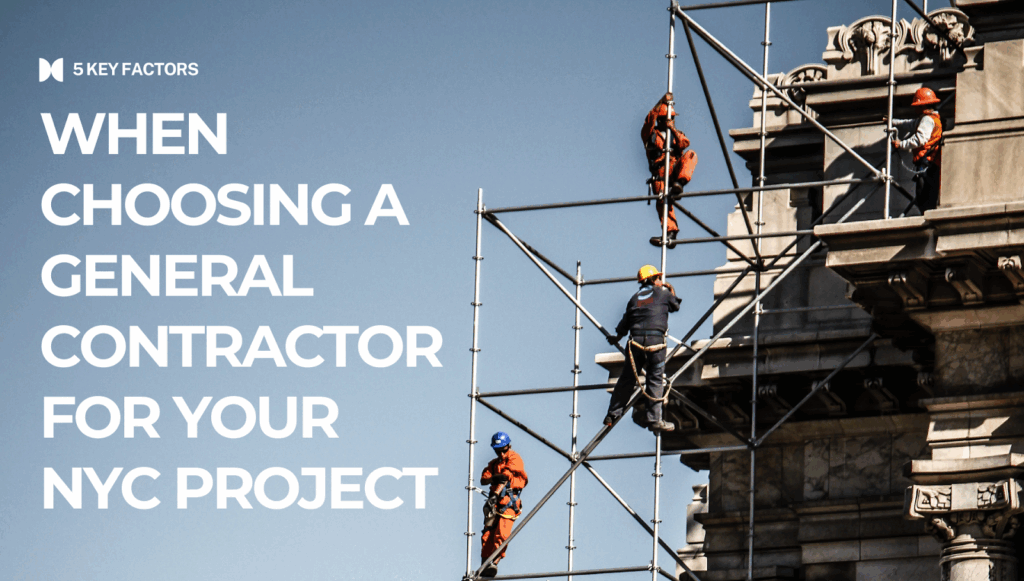
Starting a construction project in New York City is an ambitious start. From the iconic skyline that demands innovation to the intricate tapestry of historical preservation and modern development, every build here is a testament to vision and execution. At the heart of that execution lies a single, pivotal decision: choosing a general contractor in NYC.
This isn’t merely about finding someone to build; it’s about selecting a strategic partner who can navigate the city’s unique challenges, from the labyrinthine permitting processes to the logistical ballet of urban construction.
The right contractor acts as the linchpin, translating architectural designs into tangible structures, managing vast teams, orchestrating supply chains, and meticulously overseeing every detail to deliver your vision on time and within budget.
Based on our extensive experience working alongside numerous builders on a diverse range of projects across New York City; from innovative commercial spaces to intricate residential developments we’ve seen firsthand what makes a contractor truly excel. We’ve evaluated their processes, witnessed their problem-solving under pressure, and assessed their ultimate project delivery.
In this article we will break down the five non-negotiable factors that we believe every developer, property owner, and investor must consider. By focusing on these critical areas, you can significantly mitigate risks, optimize efficiency, and ensure the successful realization of your next NYC project.
1. Proven experience in New York’s built environment
New York City construction is a category of its own. Projects here face dense urban constraints, rigorous building codes, historic preservation considerations, and tight delivery timelines, conditions that even seasoned contractors from other regions struggle to navigate.
When evaluating potential partners, look beyond the number of years in business. Focus on their track record with projects similar in scale, type, and complexity to yours. A contractor who has successfully completed high-end residential renovations in Manhattan or mixed-use developments in Brooklyn is far more likely to anticipate site-specific challenges and respond quickly when they arise.
Firms like Sciame Construction and Triton Construction are well-known in the city for handling technically demanding builds with precision.
Similarly, working with an experienced general contractor in Manhattan, NYC such as Blueberry Builders offers significant advantages. Their portfolio includes projects across residential, commercial, and adaptive reuse spaces, demonstrating expertise in managing complex logistics, integrating modern systems into historic structures, and delivering results under NYC’s demanding conditions.
Pro tip: Always ask for project case studies, not just a list of completed builds. Detailed documentation of scope, timeline, and how challenges were resolved offers insight into how the contractor will approach your project.
2. Mastery of Permitting, Compliance, & Local Regulations
NYC’s regulatory landscape is among the most challenging in the country. The Department of Buildings (DOB), Landmarks Preservation Commission (LPC), Department of Transportation (DOT), Fire Department (FDNY), and numerous other agencies all play roles in the approvals process, and even a small misstep can delay your project for months.
Your contractor should demonstrate deep familiarity with these processes and proactively integrate regulatory strategy into preconstruction planning. Look for evidence that they:
- Anticipate potential bottlenecks before they occur
- Coordinate early with DOB, LPC, DOT, and FDNY
- Navigate zoning and variance processes efficiently
- Stay current with union labor, prevailing wage, and safety requirements
Contractors experienced in historic districts, for example, know how subtle design details can trigger LPC scrutiny and delays. Those who regularly coordinate with DOT understand how to schedule street closures or utility tie-ins without derailing your timeline. A GC that anticipates rather than reacts to regulatory hurdles keeps your project moving and minimizes expensive downtime.
3. Transparent Budgeting & Cost Control
A detailed budget isn’t just a financial document, it’s a project management tool. In a city where costs can escalate quickly, financial transparency and discipline are non-negotiable when choosing a GC.
The right general contractor should provide:
- Line-item estimates that clearly break down materials, labor, equipment, and contingencies
- Realistic allowances based on current NYC market pricing
- Clear change order protocols, so scope adjustments don’t spiral into unexpected costs
- Value engineering recommendations that preserve design intent while optimizing spend
Beware of bids that are significantly lower than competitors. Underbidding is a common tactic among less reputable contractors, often leading to inflated change orders later. In contrast, established firms such as Plaza Construction and Sciame emphasize predictability, offering detailed breakdowns and ongoing budget tracking to keep projects financially on course.
Expert Insight: A trustworthy GC will be able to walk you through every number in their estimate and explain potential cost variables. That level of clarity signals professionalism and financial maturity.
4. Communication & Collaboration With Design Team
In NYC construction, the most successful projects are those where contractors, skilled tech architects, engineers, and owners work as a unified team. Communication breakdowns, even minor ones can snowball into expensive mistakes and delays.
During your selection process, evaluate how potential contractors handle collaboration. Ask about:
- Reporting cadence: How often do they provide progress updates and site reports?
- Tools and systems: Do they use project management software, BIM platforms, or shared dashboards?
- Conflict resolution: How do they handle change requests, unexpected site conditions, or design clarifications?
Top-tier contractors act as proactive partners rather than passive executors. They flag constructability concerns early, propose solutions that protect both schedule and design intent, and treat collaboration as part of their craft.
Contractors known for this level of engagement help ensure that the built outcome mirrors the architect’s vision while staying practical and buildable.

5. Reputation, References, and Post-Build Support
Reputation in NYC’s construction industry is built on more than project photos, it’s earned through reliability, transparency, and how a contractor supports clients long after the ribbon-cutting. When vetting potential partners:
- Speak to multiple past clients about their experience. Ask specific questions about schedule adherence, communication style, and responsiveness to challenges.
- Review complaint and litigation history to identify potential red flags.
- Ask about post-completion support, including warranties, punch list handling, and ongoing maintenance assistance.
Established contractors invest in relationships that extend far beyond ribbon-cutting. They view successful delivery as the beginning of a partnership, not the end. That commitment provides peace of mind that any issues after turnover will be addressed promptly and professionally.
Build Your NYC Project on a Strong Foundation
Choosing the right GC isn’t just about pouring concrete or framing walls, it’s about partnering with a team that understands New York’s regulatory complexity, anticipates logistical challenges, and collaborates closely with your design vision. The decision you make here will shape the outcome of your entire project.
For developers and design professionals, this choice is one of the most strategic decisions you’ll make. Partnering with an experienced general contractor in Manhattan, NYC who brings deep local knowledge, transparent communication, and a solutions-oriented approach can mean the difference between a project that struggles and one that succeeds.
Use these five factors as your framework when evaluating potential partners. With the right contractor by your side, your next NYC project won’t just be completed; it will be delivered with precision, confidence, and enduring value.











